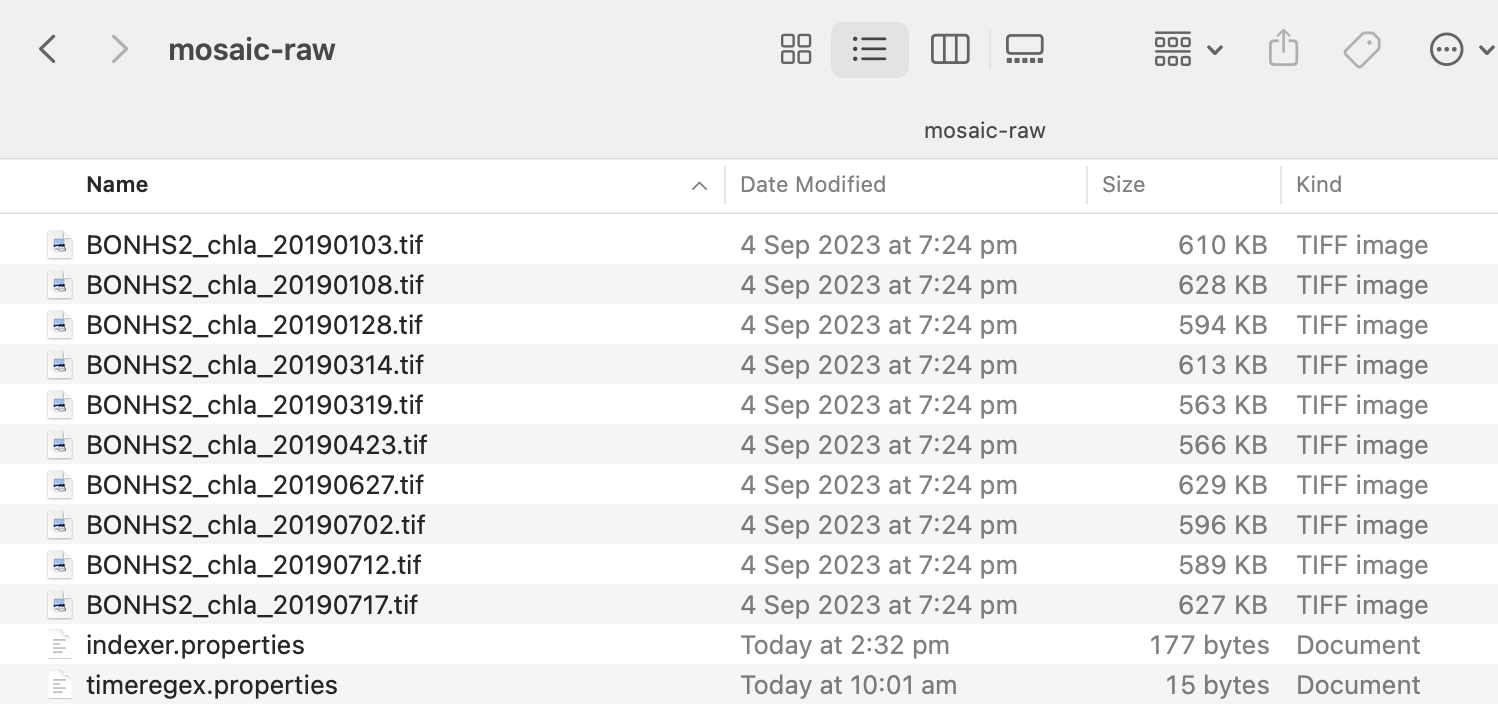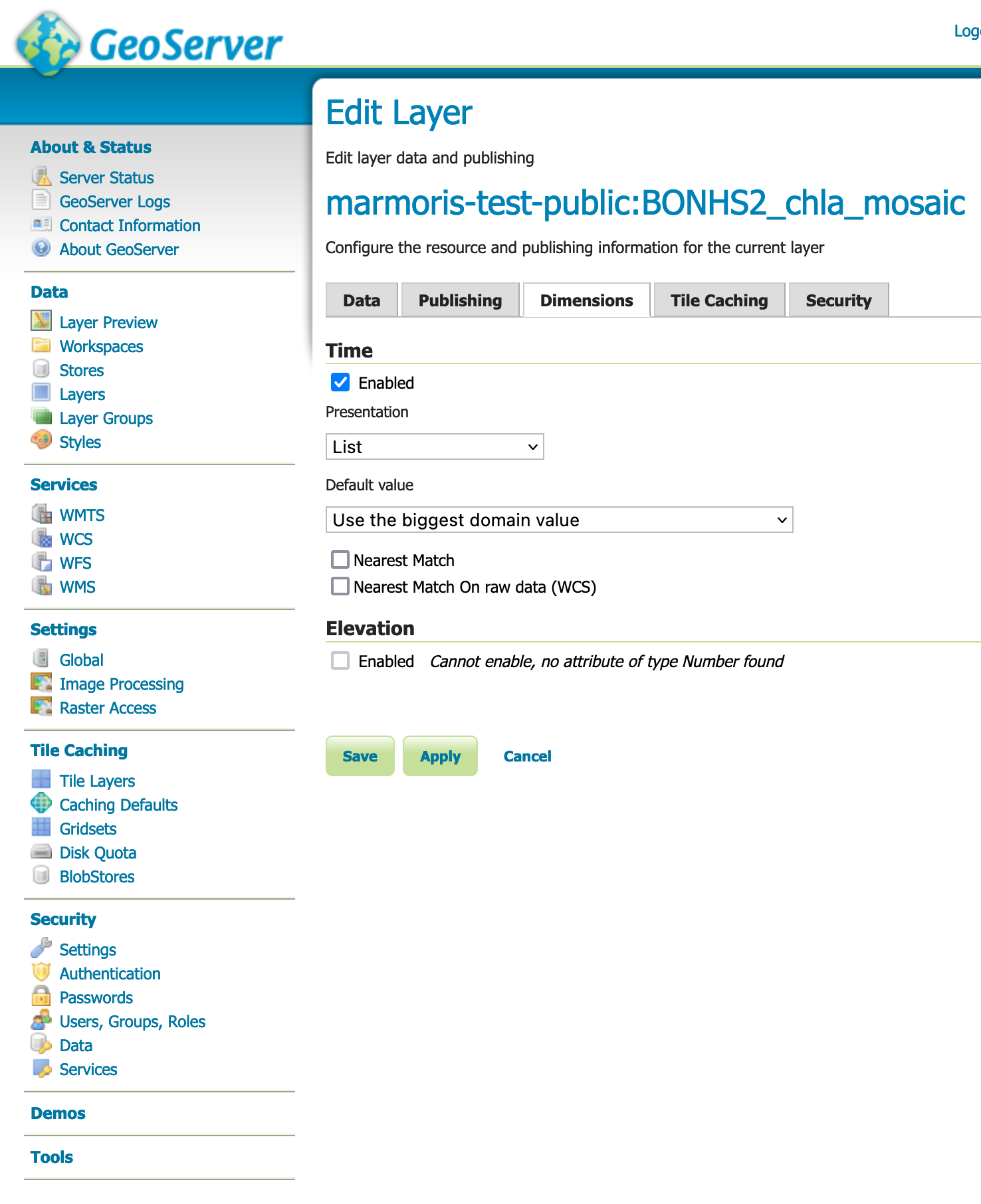Creating Time-series ImageMosaic Layers in GeoServer
This guide shows how to create an ImageMosaic layer in GeoServer with a time dimension. Once created, the WMS layer can be added to TerriaMap and displayed as a time series.
For more details, see the official GeoServer tutorial: https://docs.geoserver.org/latest/en/user/data/raster/imagemosaic/tutorial.html
Set up data folder
- Place all single-band GeoTIFFs into a folder in GeoServer's
data_dir - Each filename must contain an 8-digit timestamp in
YYYYMMDDformat (e.g.,BONHS2_chla_20190717.tif) - Add
indexer.propertiesandtimeregex.propertiesconfiguration files to the folder (see below) - Your folder structure should look like this:

indexer.properties
Schema=*the_geom:Polygon,location:String,time:java.util.Date
PropertyCollectors=TimestampFileNameExtractorSPI[timeregex](time)
TimeAttribute=time
Caching=true
AbsolutePath=false
timeregex.properties
regex=[0-9]{8}
For more information about these configuration files, see: https://docs.geoserver.org/latest/en/user/data/raster/imagemosaic/configuration.html
Create data store and layer in GeoServer
- Create a new "ImageMosaic" raster data source and select the folder containing your GeoTIFFs and
.propertiesfiles - Publish the mosaic layer
- Enable the time dimension as shown:

- Configure the layer styling
Example style
This example uses a GnBu color ramp with values from 0.25 to 0.45:
![]()
<?xml version="1.0" encoding="UTF-8"?>
<StyledLayerDescriptor xmlns="http://www.opengis.net/sld" xmlns:sld="http://www.opengis.net/sld" version="1.0.0" xmlns:gml="http://www.opengis.net/gml" xmlns:ogc="http://www.opengis.net/ogc">
<UserLayer>
<sld:LayerFeatureConstraints>
<sld:FeatureTypeConstraint/>
</sld:LayerFeatureConstraints>
<sld:UserStyle>
<sld:Name>raster-gnbu</sld:Name>
<sld:FeatureTypeStyle>
<sld:Rule>
<sld:RasterSymbolizer>
<sld:ChannelSelection>
<sld:GrayChannel>
<sld:SourceChannelName>1</sld:SourceChannelName>
</sld:GrayChannel>
</sld:ChannelSelection>
<sld:ColorMap type="ramp">
<sld:ColorMapEntry label="0.25" quantity="0.25" color="#f0f9e8"/>
<sld:ColorMapEntry label="0.30" quantity="0.30" color="#bae4bc"/>
<sld:ColorMapEntry label="0.35" quantity="0.35" color="#7bccc4"/>
<sld:ColorMapEntry label="0.40" quantity="0.40" color="#43a2ca"/>
<sld:ColorMapEntry label="0.45" quantity="0.45" color="#0868ac"/>
</sld:ColorMap>
</sld:RasterSymbolizer>
</sld:Rule>
</sld:FeatureTypeStyle>
</sld:UserStyle>
</UserLayer>
</StyledLayerDescriptor>
Notes
Multiple dimensions
You can include more than one dimension in your mosaic. The documentation shows an example of extracting elevation from filenames. Each dimension will appear as a dropdown menu in TerriaMap's workbench.